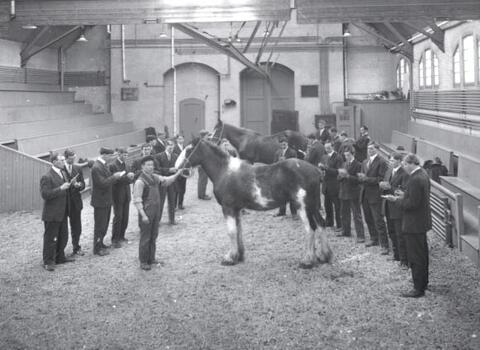
Zone du titre et de la mention de responsabilité
Titre propre
Agriculture - Horses
Dénomination générale des documents
- Document graphique
Titre parallèle
Compléments du titre
Mentions de responsabilité du titre
Notes du titre
Niveau de description
Pièce
Cote
Zone de l'édition
Mention d'édition
Mentions de responsabilité relatives à l'édition
Zone des précisions relatives à la catégorie de documents
Mention d'échelle (cartographique)
Mention de projection (cartographique)
Mention des coordonnées (cartographiques)
Mention d'échelle (architecturale)
Juridiction responsable et dénomination (philatélique)
Zone des dates de production
Date(s)
-
[192-?] (Production)
Zone de description matérielle
Description matérielle
1 photograph : b&w ; 25 x 20 cm
1 negative : b&w ; 3.5 x 3.5 cm
1 glass negative : b&w ; 25 x 20 cm
Zone de la collection
Titre propre de la collection
Titres parallèles de la collection
Compléments du titre de la collection
Mention de responsabilité relative à la collection
Numérotation à l'intérieur de la collection
Note sur la collection
Zone de la description archivistique
Nom du producteur
Historique de la conservation
Portée et contenu
Two horses held by their bridles are judged in Livestock Pavilion.
Bio/Historical Note: By 1910, 19 horses had been purchased by the College of Agriculture that were good work horses or suitable for student class work. Two were purebred Clydesdales. Three light horses were also purchased. One named Barney was used in the morning to deliver milk to faculty in Nutana and in the afternoon on the buggy as Dean Rutherford made his farm rounds. In 1920 the Province asked the Animal Husbandry Department to establish a Clydesdale breeding stud. This led to development of an outstanding collection of prize winning horses that became a focus of the Department. In the 1920s the Percheron and Belgian breeders also demanded support for their breeds and so they were included in the university stud and some cross breeding was undertaken. The campus horses were used for field work for all Departments, general hauling and site work for new buildings. An unofficial use was for the Lady Godiva ride across campus each fall. By the 1940s it was clear that the era of horses as a main source of farm power was over. The final stallion used in the breeding program was the imported "Windlaw Proprietor," grand champion stallion at the 1946 Royal Winter Fair.

